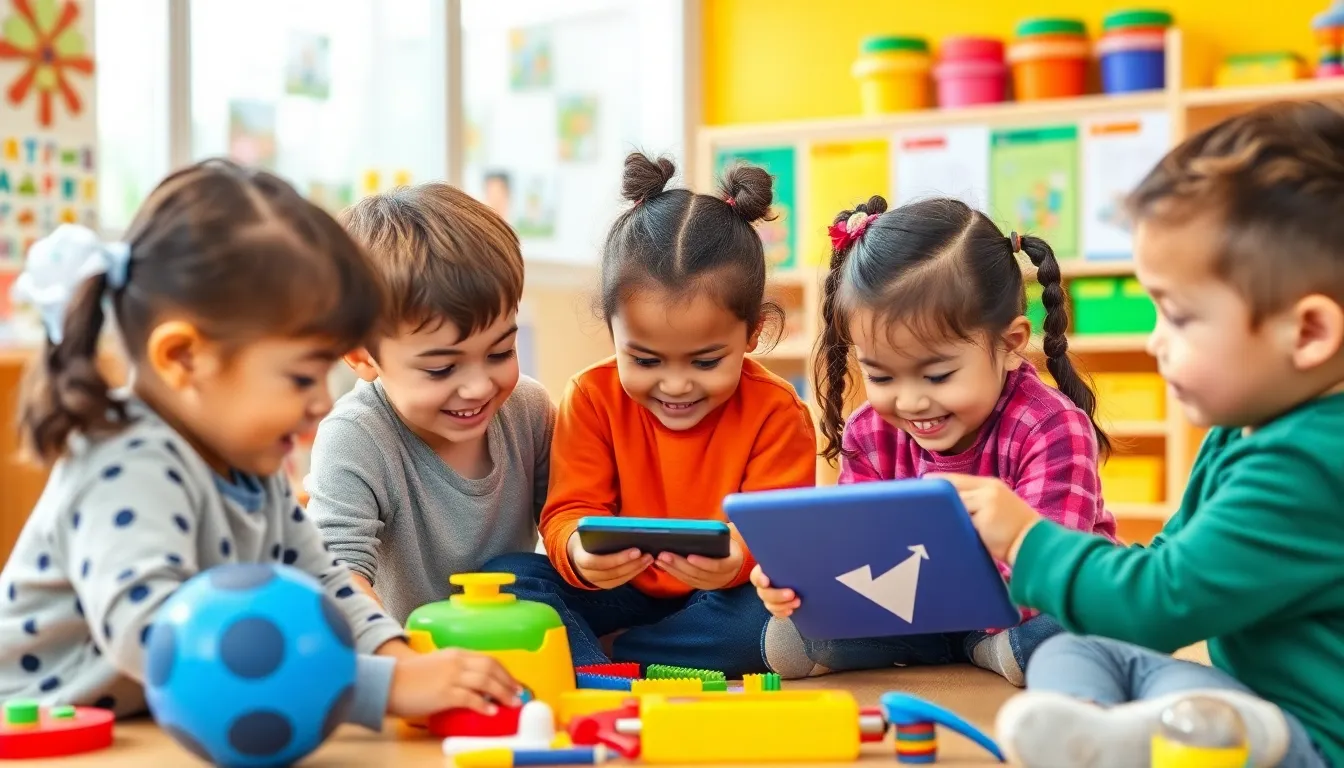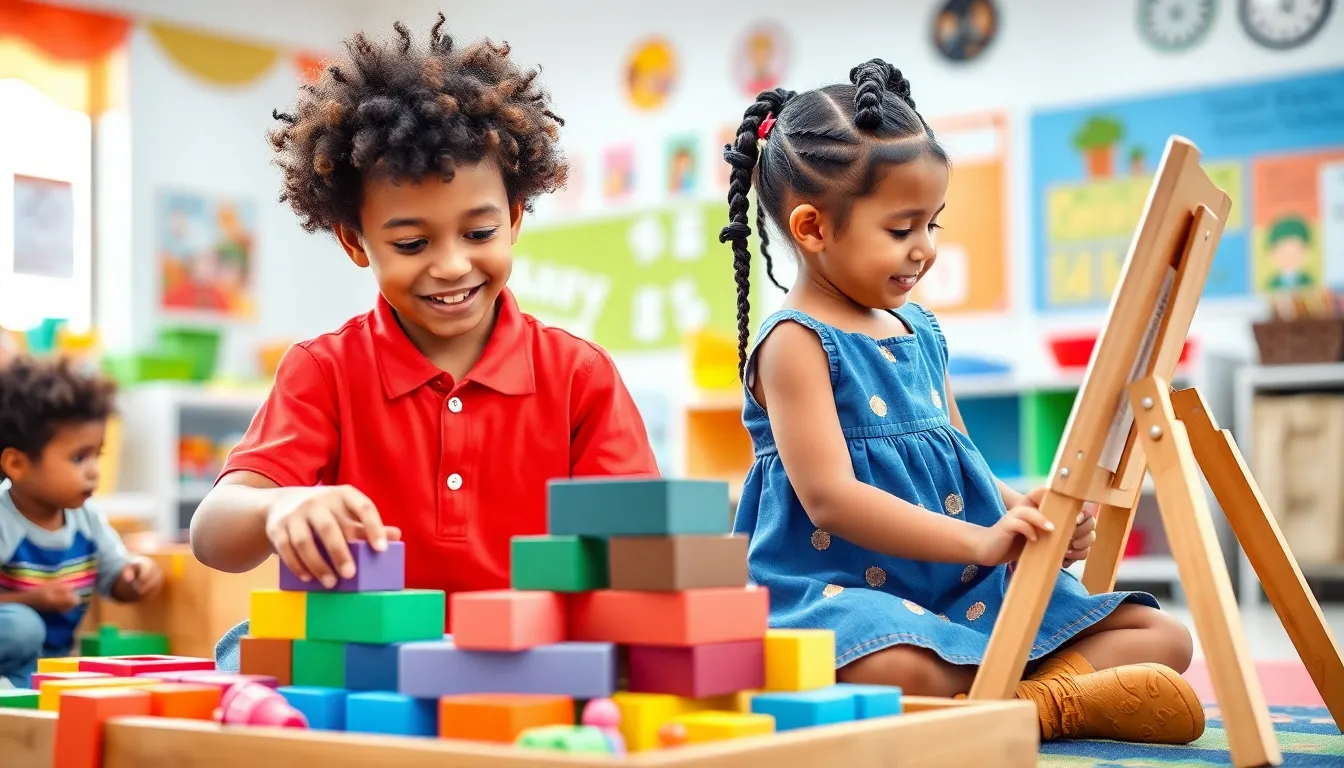In a world where toddlers can teach their parents how to use smartphones, early childhood education is more crucial than ever. It’s not just about learning the ABCs anymore; it’s about nurturing creativity, critical thinking, and social skills in tiny humans who might one day run the universe—or at least their own lemonade stands.
Today’s early childhood education focuses on interactive learning and play-based approaches that turn classrooms into vibrant playgrounds of discovery. As parents juggle work, life, and the occasional tantrum, understanding the landscape of early education can feel like trying to assemble IKEA furniture without the instructions. But fear not! This article will break down the essentials of early childhood education today, making it as easy as pie—assuming the pie isn’t too hot to handle.
Table of Contents
ToggleThe Importance of Early Childhood Education Today
Early childhood education plays a crucial role in shaping the foundation of a child’s future. Today’s educational landscape emphasizes the significance of nurturing young minds during their formative years.
Benefits for Child Development
Child development benefits immensely from early education programs. Cognitive skills build through interactive learning experiences. Social abilities flourish in environments that encourage teamwork and collaboration. Emotional intelligence grows as children navigate relationships with peers. Additionally, creativity expands with access to diverse activities that promote exploration and expression.
Long-term Impact on Society
Society experiences a profound long-term impact due to early childhood education. Communities thrive when children enter school ready to learn, as this boosts academic performance. Economic growth often correlates with higher rates of educational attainment, reducing reliance on social services. Moreover, crime rates decrease in populations with strong early education investments, leading to safer neighborhoods. As a result, fostering early learning creates a ripple effect that enhances societal well-being.
Current Trends in Early Childhood Education Today

Current trends in early childhood education reflect a shift towards interactive and engaging learning environments. Educators prioritize methods that nurture creativity and critical thinking.
Play-based Learning Approaches
Play-based learning approaches dominate today’s classrooms. Young children learn best through exploration and hands-on activities. Incorporating imaginative play fosters social skills and emotional development. Educators design activities that encourage problem-solving and teamwork. They recognize that play is not merely a break from learning but an essential process. Research indicates that students engaged in play-based programs demonstrate better cognitive outcomes. Schools focus on balancing structured learning with free play, ultimately promoting holistic development.
Technology Integration in Classrooms
Technology integration in classrooms provides new opportunities for young learners. Interactive tools enhance engagement and streamline lesson delivery. Teachers employ educational apps and resources to support various learning styles. Digital platforms facilitate collaboration among students. Analysts report increases in student motivation and engagement through technology use. Children become adept at navigating digital tools, preparing them for a tech-driven world. Schools emphasize balance, ensuring screen time complements hands-on activities without overshadowing traditional learning methods.
Challenges Facing Early Childhood Education Today
Early childhood education encounters several significant challenges that impact its effectiveness and accessibility. Addressing these challenges is essential for cultivating a supportive learning environment for young children.
Access and Equity Issues
Access remains a critical challenge in early childhood education. Many families lack affordable options, leading to disparities in education. Communities with limited resources often face barriers that prevent children from receiving quality early learning experiences. This inequity affects marginalized populations most severely, reducing their chances for future academic success. Policymakers must prioritize strategies that boost access to early education for all families. Advocacy for universal pre-K programs has gained momentum, addressing this crucial gap in services.
Funding and Resource Limitations
Funding and resource limitations pose another significant hurdle. Many early childhood programs operate on tight budgets, impacting their ability to provide comprehensive services. Insufficient funds lead to staff shortages and inadequate training opportunities, which adversely affect program quality. Research shows that high-quality early education requires adequate funding to succeed. State and federal investments play a crucial role in enhancing early childhood education. Advocates emphasize the importance of long-term commitments to funding as essential for creating sustainable and effective early learning environments.
Best Practices for Educators in Early Childhood Education Today
Effective early childhood education actively implements strategies that foster optimal learning environments. Educators can adopt several best practices to enhance the overall experience for young learners.
Creating Inclusive Classrooms
Inclusive classrooms promote diversity and ensure every child feels valued. Teachers incorporate diverse curricula that reflect various cultures, backgrounds, and abilities. Sensitivity training for educators equips them to recognize and address individual needs effectively. Modifying activities to accommodate different learning styles enhances participation and engagement. Utilizing multilingual resources helps children from non-English speaking backgrounds feel welcome. Peer mentoring fosters social connections, allowing students to support one another, which strengthens the community. By implementing these strategies, educators create an environment where all children thrive.
Encouraging Family Engagement
Family engagement significantly boosts children’s educational experiences. Communication between teachers and parents promotes trust and partnership. Regular workshops help parents understand learning objectives, providing tools to support their child’s development at home. Open houses and family events create opportunities for families to participate in the learning journey. Inviting family members to share their expertise enriches classroom discussions and broadens perspectives. Creating volunteer opportunities allows parents to take active roles in the classroom, fostering stronger connections. Prioritizing family involvement leads to improved student outcomes and a positive school community.
Early childhood education is more crucial than ever in fostering a child’s development and preparing them for future success. By embracing interactive and play-based learning, educators can nurture creativity and critical thinking while also addressing the diverse needs of young learners.
The challenges of access and funding must be met with innovative solutions and strong advocacy to ensure all children benefit from quality early education. As communities recognize the long-term societal impacts of investing in early learning, the push for equitable access and comprehensive resources will shape a brighter future for generations to come.
Prioritizing these efforts not only enhances individual child outcomes but also strengthens communities as a whole, creating a ripple effect that benefits everyone.



